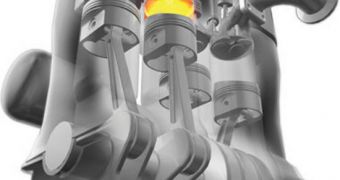Scientists at a private company called the Scuderi Group announce the development of an innovative type of engine, that allows for an increased fuel efficiency when compared to normal engines. The main way this is done is by storing compressed air, the experts who developed the motor say.
When compared to an engine constructed after a conventional design, the new one would be between 25 and 36 percent more efficient, which would in turn translate into a 50 percent fuel economy boost.
The novel design has already attracted nine major automotive giants, say representatives from the Scuderi Group. The corporations have already signed a non-disclosure agreement, and were shown the specific details of the project.
Generally, car manufacturers do not turn to other companies for the engines, as they prefer to develop them in-house, as the central concept around which a car is later built. But external influences are now forcing a rethink of their approach.
Some of these factors include more drastic pollution laws, demands for maximizing fuel efficiency and other such things. Car manufacturers find themselves in a pickle, which is why they are now ready to listen to proposals such as the one that the Scuderi Group is making.
The company was founded in 2002, and its president, Sal Scuderi, explains that it managed to collect more than $65 million for research&development (R&D) from a variety of sources.
Before the year is over, the official says, Scuderi will most likely sign a contract for licensing the new technology with at least one of the nine car manufacturers that were shown the specifics.
Several automotive giants have innovated their engines considerably since 2004, but only in the range of 20 percent or so. The Scuderi design allows for at least a 50 percent boost in fuel efficiency.
The new motor relies on the use of compressed air for augmenting its functionality. Thus far, only a prototype is available, but the company is working on developing a test version, that could actually be installed on a car.
The figure it is now operating with have been derived from computer simulations and comparisons, against available data for 2004 Chevrolet Cavalier. A large number of simulations exists for this model.
Experts at various analyst groups say that manufacturers will most likely wait for the actual tests before they decide if they are going to go ahead with licensing the technology or not. Ultimately, it's up to Scuderi to capture its own clients, Technology Review reports.

 14 DAY TRIAL //
14 DAY TRIAL //